Acts in Three Acts I
Chris Knepp
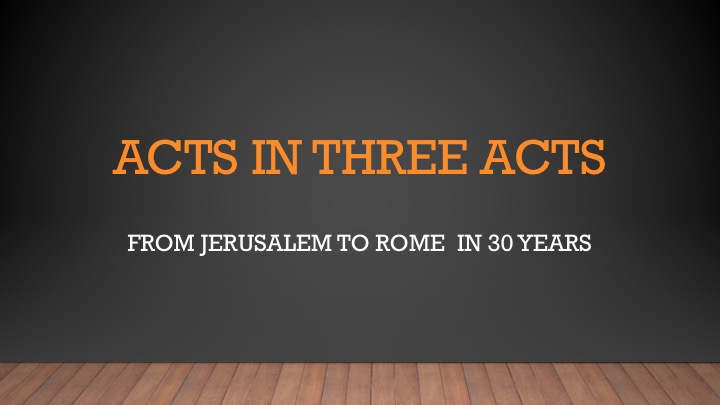
Acts in Three Acts
From Jerusalem to Rome in 30 years
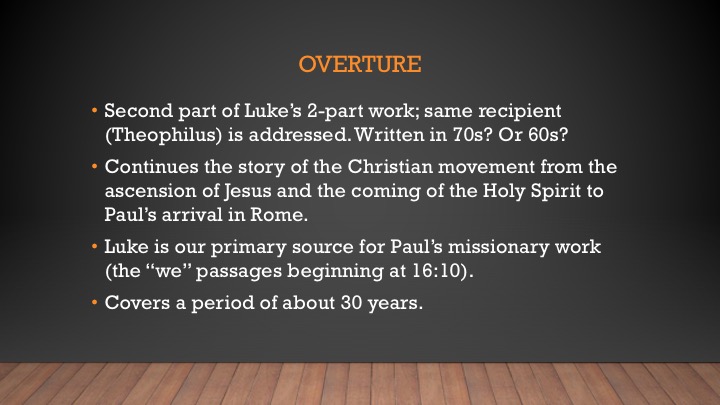
OVERTURE
Second part of Luke’s 2-part work; same recipient (Theophilus) is addressed. Written in 70s? Or 60s?
Continues the story of the Christian movement from the ascension of Jesus and the coming of the Holy Spirit to Paul’s arrival in Rome.
Luke is our primary source for Paul’s missionary work (the “we” passages beginning at 16:11).
Covers a period of about 30 years.
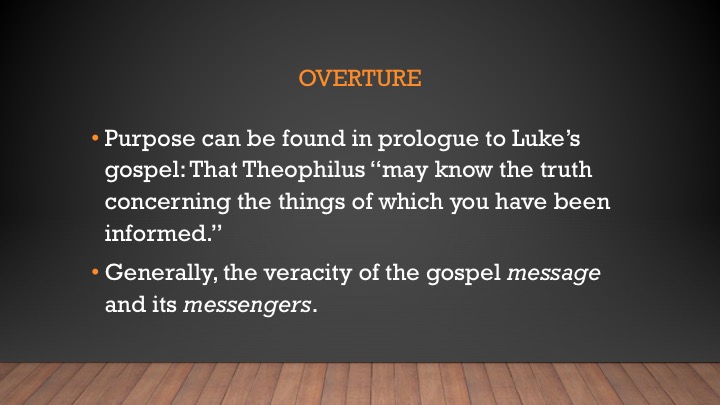
OVERTURE
Purpose can be found in prologue to Luke’s gospel: That Theophilus “may know the truth concerning the things of which you have been informed.”
Generally, the veracity of the gospel message and its messengers.
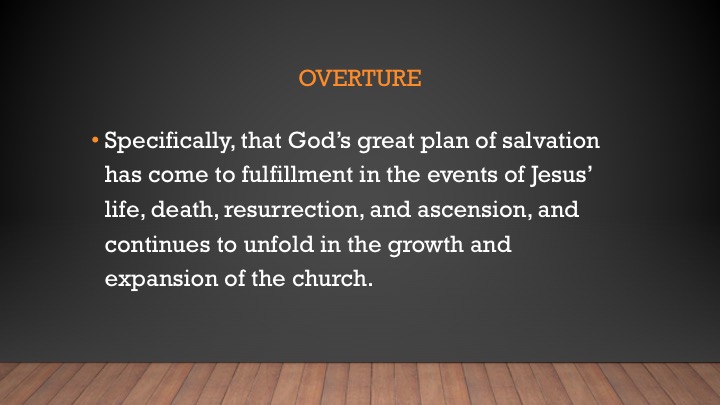
OVERTURE
Specifically, that God’s great plan of salvation has come to fulfillment in the events of Jesus’ life, death, resurrection, and ascension, and continues to unfold in the growth and expansion of the church.
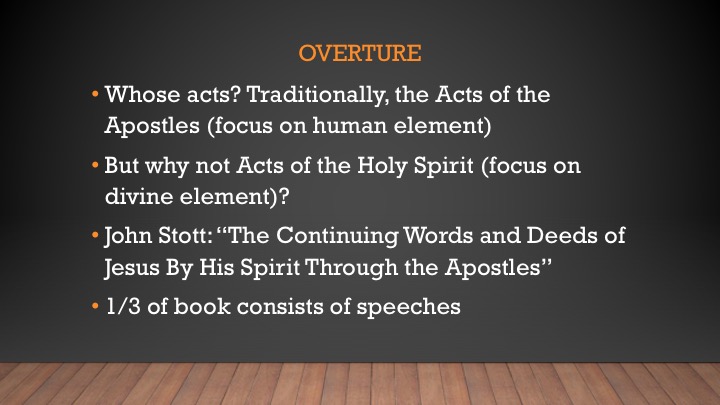
OVERTURE
Whose acts? Traditionally, the Acts of the Apostles (focus on human element)
But why not Acts of the Holy Spirit (focus on divine element)?
John Stott: “The Continuing Words and Deeds of Jesus By His Spirit Through the Apostles”
1/3 of book consists of speeches
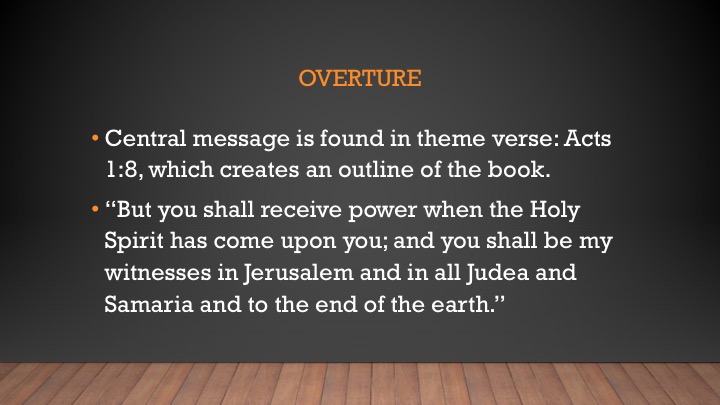
OVERTURE
Central message is found in theme verse: Acts 1:8, which creates an outline of the book.
“But you shall receive power when the Holy Spirit has come upon you; and you shall be my witnesses in Jerusalem and in all Judea and Samaria and to the end of the earth.”
Acts in Three Acts - The Overall Structure
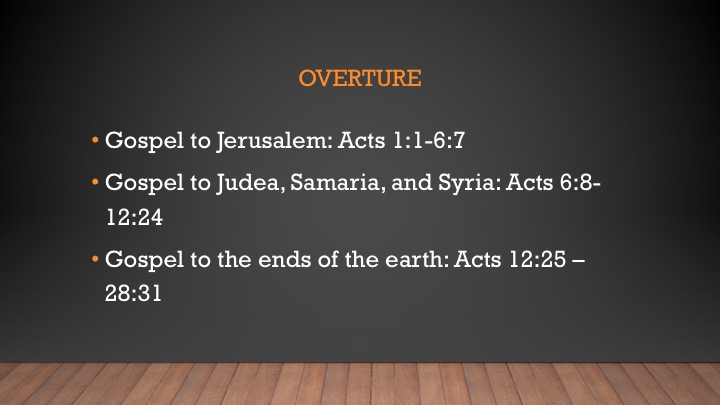
OVERTURE
The overall structure of the book of Acts is:
- Gospel to Jerusalem: Acts 1:1-6:7
- Gospel to Judea, Samaria, and Syria: Acts 6:8-12:24
- Gospel to the ends of the earth: Acts 12:25 – 28:31
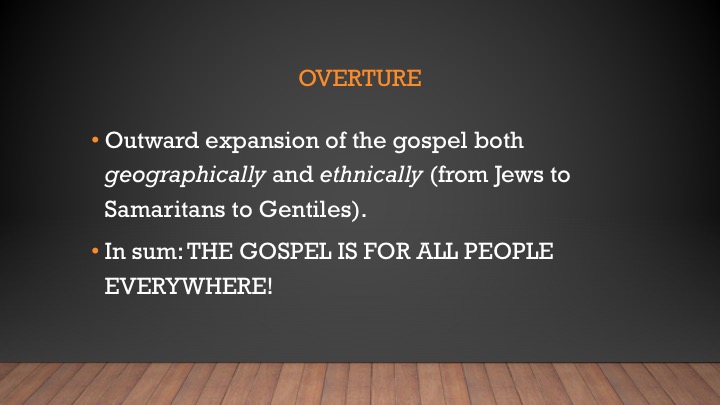
OVERTURE
Outward expansion of the gospel both geographically and ethnically (from Jews to Samaritans to Gentiles).
In sum: THE GOSPEL IS FOR ALL PEOPLE EVERYWHERE!
Acts in Three Acts - Act I
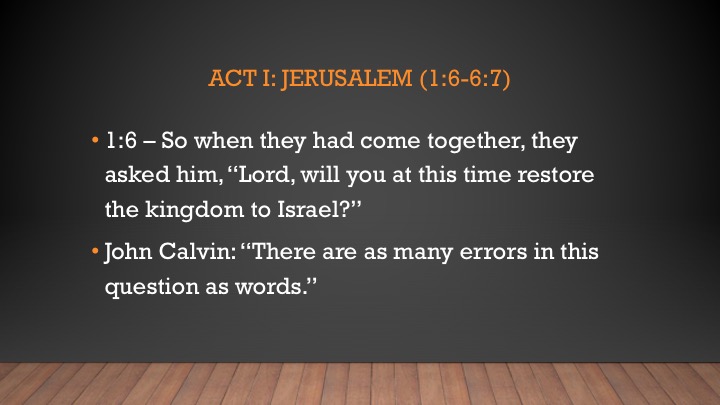
ACT I: JERUSALEM (1:6-6:7)
1:6 – So when they had come together, they asked him, “Lord, will you at this time restore the kingdom to Israel?”
John Calvin: “There are as many errors in this question as words.”
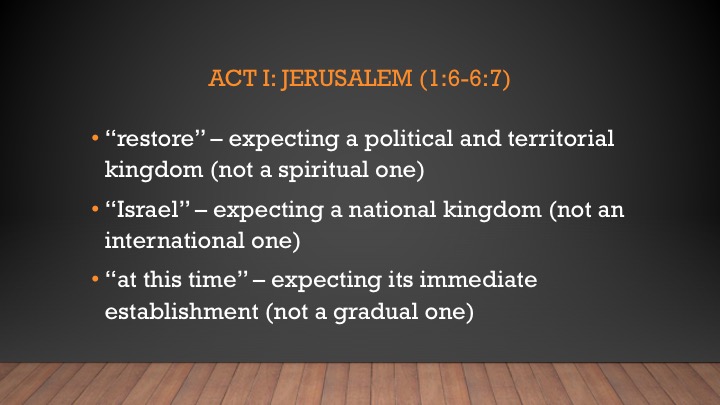
ACT I: JERUSALEM (1:6-6:7)
“restore” – expecting a political and territorial kingdom (not a spiritual one)
“Israel” – expecting a national kingdom (not an international one)
“at this time” – expecting its immediate establishment (not a gradual one)
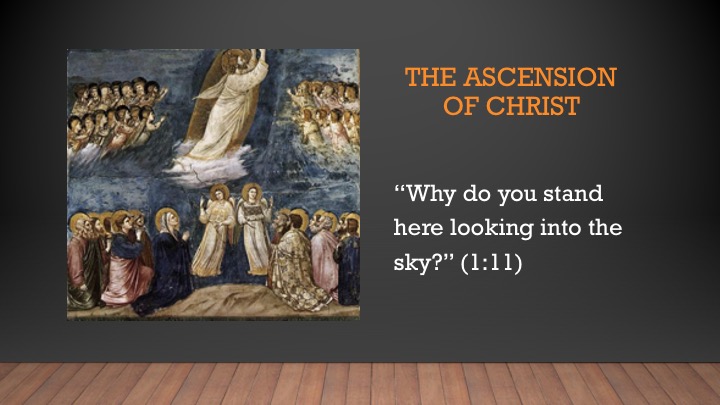
The Ascension of Christ
Why do you stand here looking into the sky?” (Acts 1:11)
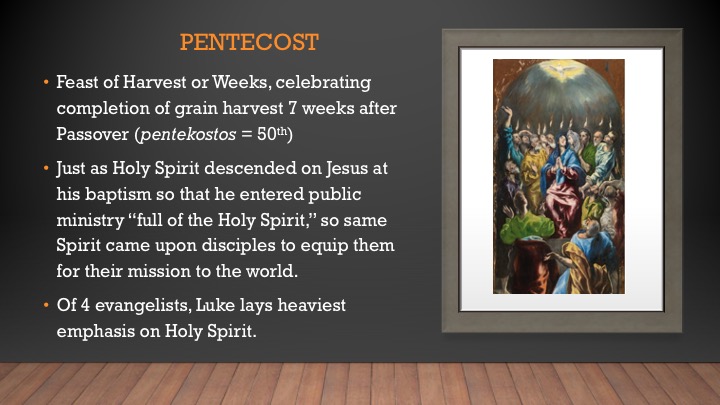
Pentecost
Feast of Harvest or Weeks, celebrating completion of grain harvest 7 weeks after Passover (pentekostos = 50th)
Just as Holy Spirit descended on Jesus at his baptism so that he entered public ministry “full of the Holy Spirit,” so same Spirit came upon disciples to equip them for their mission to the world.
Of 4 evangelists, Luke lays heaviest emphasis on Holy Spirit.
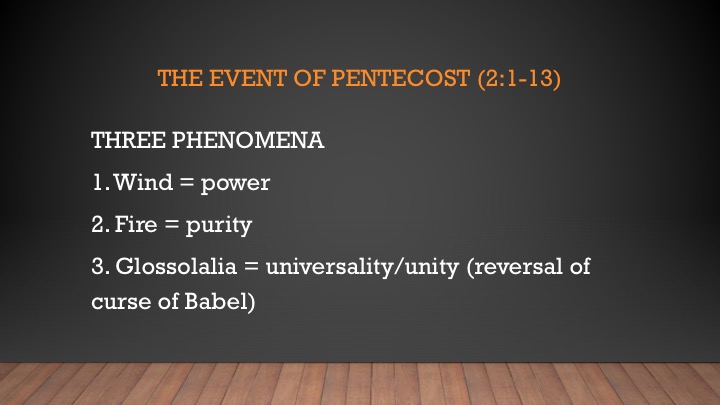
The Event of Pentecost (Acts 2:1-13)
THREE PHENOMENA
1. Wind = power
2. Fire = purity
3. Glossolalia = universality/unity (reversal of curse of Babel)
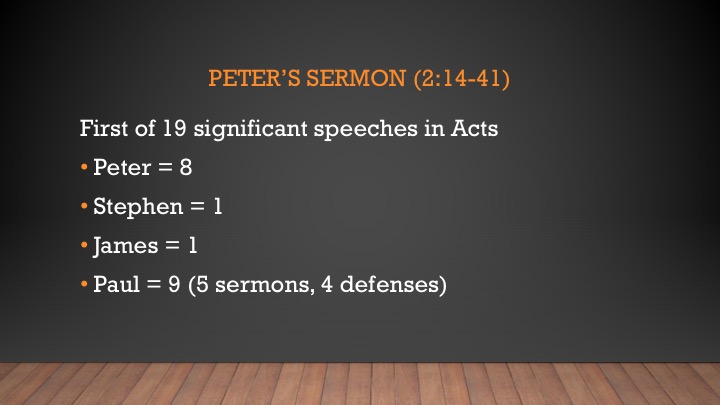
PETER’S SERMON (Acts 2:14-41)
First of 19 significant speeches in Acts
Peter = 8
Stephen = 1
James = 1
Paul = 9 (5 sermons, 4 defenses)
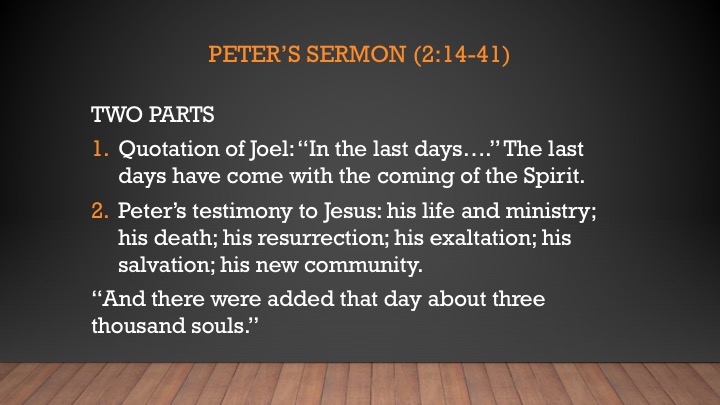
PETER’S SERMON (2:14-41)
TWO PARTS
1.Quotation of Joel: “In the last days….” The last days have come with the coming of the Spirit.
2.Peter’s testimony to Jesus: his life and ministry; his death; his resurrection; his exaltation; his salvation; his new community.
“And there were added that day about three thousand souls.”
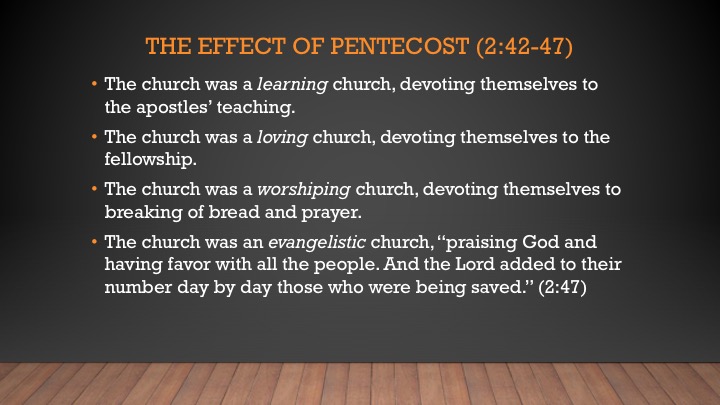
The Effect of Pentecost (2:42-47)
The church was a learning church, devoting themselves to the apostles’ teaching.
The church was a loving church, devoting themselves to the fellowship.
The church was a worshiping church, devoting themselves to breaking of bread and prayer.
The church was an evangelistic church, “praising God and having favor with all the people. And the Lord added to their number day by day those who were being saved.” (2:47)
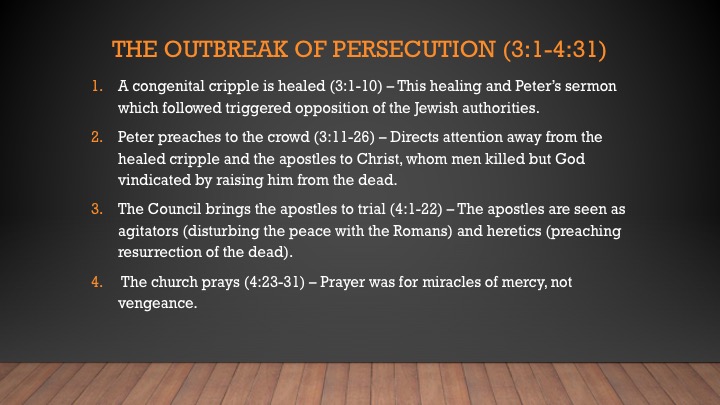
The Outbreak of Persecution (3:1-4:31)
1. A congenital cripple is healed (3:1-10) – This healing and Peter’s sermon which followed triggered opposition of the Jewish authorities.
2. Peter preaches to the crowd (3:11-26) – Directs attention away from the healed cripple and the apostles to Christ, whom men killed but God vindicated by raising him from the dead.
3. The Council brings the apostles to trial (4:1-22) – The apostles are seen as agitators (disturbing the peace with the Romans) and heretics (preaching resurrection of the dead).
4. The church prays (4:23-31) – Prayer was for miracles of mercy, not vengeance.
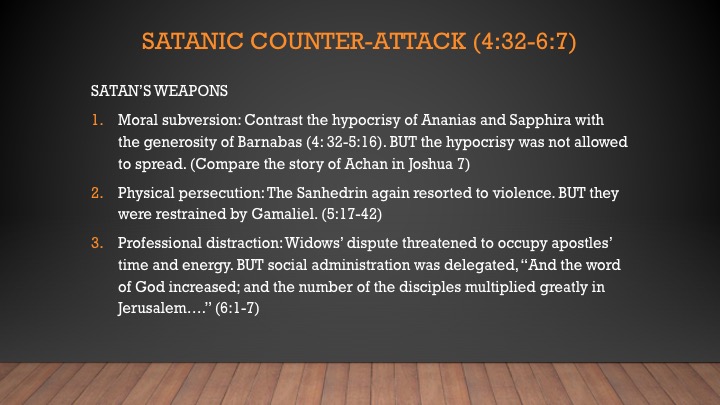
Satanic Counter-Attack (4:32-6:7)
SATAN’S WEAPONS
1.Moral subversion: Contrast the hypocrisy of Ananias and Sapphira with the generosity of Barnabas (4: 32-5:16). BUT the hypocrisy was not allowed to spread. (Compare the story of Achan in Joshua 7)
2.Physical persecution: The Sanhedrin again resorted to violence. BUT they were restrained by Gamaliel. (5:17-42)
3.Professional distraction: Widows’ dispute threatened to occupy apostles’ time and energy. BUT social administration was delegated, “And the word of God increased; and the number of the disciples multiplied greatly in Jerusalem….” (6:1-7)
Acts in Three Acts - Act II Next Week
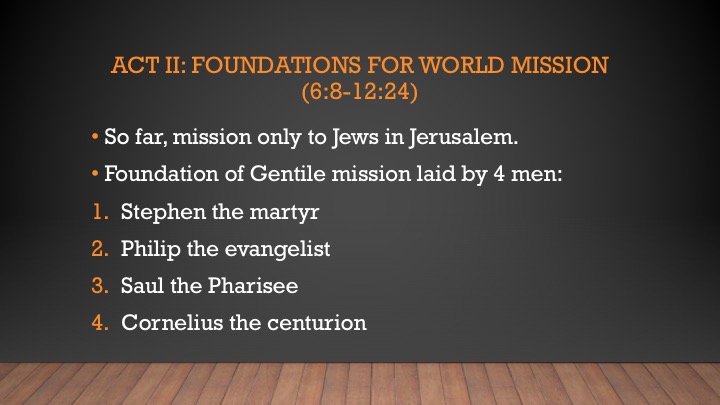
ACT II Next Week: Foundations for World Mission (6:8-12:24)
So far, mission only to Jews in Jerusalem.
Foundation of Gentile mission laid by 4 men:
1.Stephen the martyr
2.Philip the evangelist
3.Saul the Pharisee
4.Cornelius the centurion